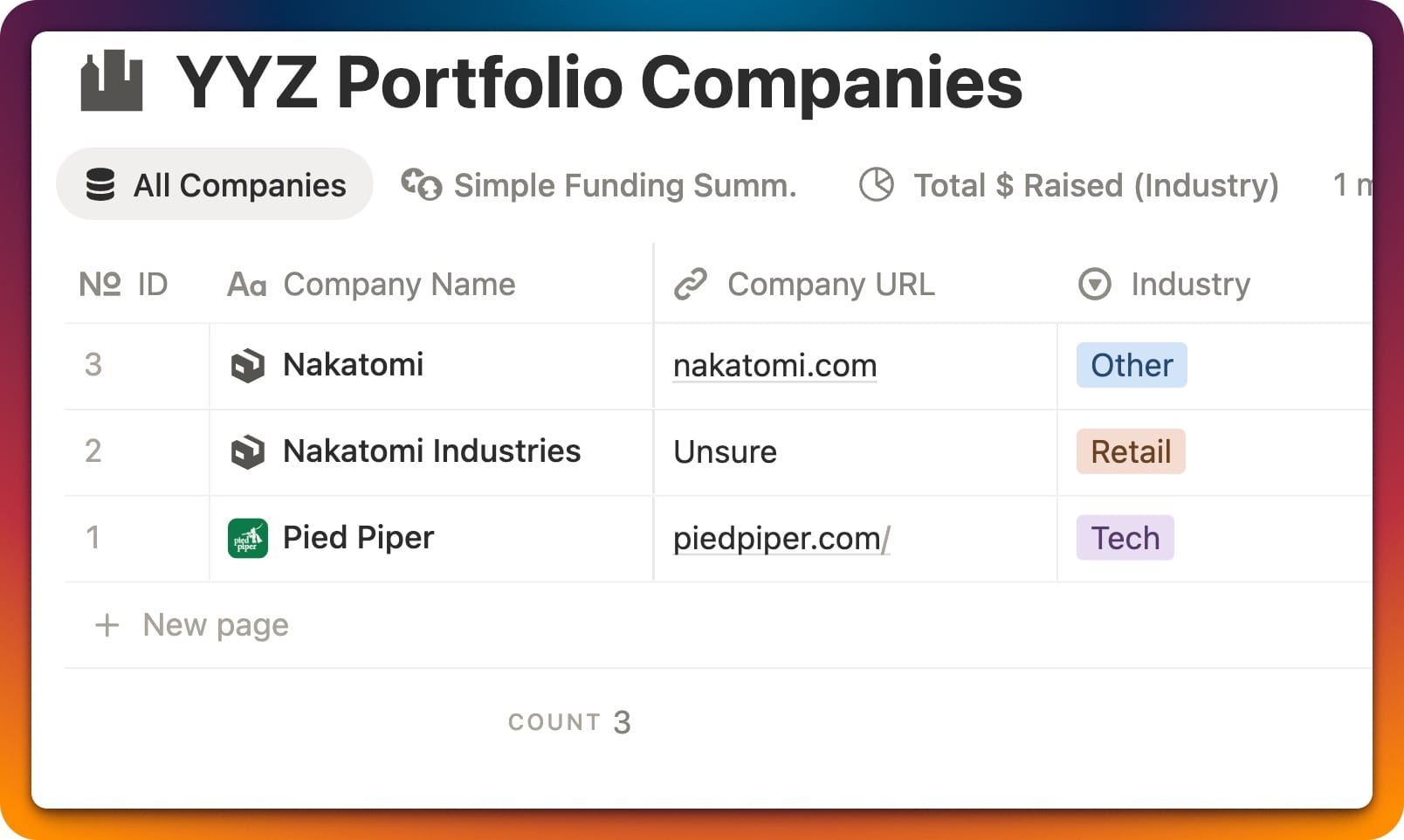A Case Study in No-Code Failure

YYZ is a successful mid-sized VC firm. A few years back, it conducted an extensive search for a new managing partner. Among the candidates who interviewed for the position, Adam clearly stood out from his peers. Yeah, he knew the industry, but no one else asked about YYZ's existing systems and tech. In short, they were a mess. Disparate Excel spreadsheets and a torrent of emails ruled the day.
Before accepting the position, Adam stressed the need to make significant tech changes after joining. First up: the firm needed to turn chaos into order—and that required adopting new tech. The popular magnet app Notion was squarely in his crosshairs.

Background
In his previous position, Adam had used the popular no-code tool. He was an unapologetic fanboy. Notion allowed everyone at his previous employer to easily retrieve key information, including:
- The status of each deal.
- The ROI of each investment.
- A summary of weekly, monthly, quarterly, and annual performance.
- Total funds invested by industry.
- Which employees were closing which deals—and which were the most successful.
People spent minimal time reconciling errors. Accurate reporting was a breeze. Things just worked. Why shouldn't YYZ function the same way?
A New Tool Begets the Same Problems
Adam spent the first few months creating a bespoke Notion system. Not long after launching it, though, things at YYZ began rapidly devolving. Information in Notion sometimes conflicted with the company's bank statements, accounting system, internal emails, and signed, legally binding documents. Late-night data investigations were becoming commonplace.
In one particularly galling example, YYZ nearly remitted the same six-figure Series-A payment to a portfolio company twice. Six weeks later, a promising biotech startup opted to go with another VC firm because it was more organized.
Beyond these alarming one-off incidents, other system-related problems plagued the company. Although it used a top-tier tool, answers to simple business questions proved elusive. Here are a few:
- Where do we stand with each deal?
- How much have we invested in each company and industry by stage?
- What is the status of each term sheet we've sent out?
- Who was the last person to talk to the potential portfolio company about a potential investment?
Adam wasn't the only one peeved. The other YYZ partners were none too pleased at its current state of affairs.
Of course, it didn't need to be this way. Let's dive into what happened.
Root Cause Analysis
Notion was supposed to function as a single source of truth at YYZ. Instead, it had morphed into a morass of incomplete, outdated, missing, or duplicate information. Reports from it had become mere guides—starting points to find the truth. Some were downright meaningless. GIGO at its finest.
You may infer that YYZ's plight stemmed solely from its tech. Rest assured, it did not. As is usually the case, humans are to blame.
Duplicate Records and Conflicting Information
A galling lack of internal controls allowed anyone at YYZ to enter just about anything into Notion. Let's start with duplicate entries. Many employees who couldn't locate an existing record simply created a new one.

You needn't be an expert in data modeling or master data management to appreciate the problems that this practice causes.
And then there were the issues related to an individual record's existing property—Notionspeak for a database field or column, if you like. Some employees created new, overlapping, and unnecessary properties that told different stories. Take deal status, for instance. NotionAI could help identify YYZ's discrepancies among three conflicting values, but it could not resolve them.
In a few cases, people took a DIY approach and created their own, separate Notion databases to track their deals. One rogue worker—a promising new hire—ignored Notion entirely and opted to use a Google Sheet.
So why was data quality at YYZ an utter mess? We need to keep asking why.

Human Factors, Not Tech Ones
In a way, Notion was destined to fail at YYZ—as was any new tool. The company failed to properly train its employees on its new system and related processes. What's more, Adam and his team failed to lock down Notion databases to prevent the very issues they'd soon encounter. To some extent, everyone was an admin.1
Many people blew off training sessions because they were too busy or had noodled with Notion on their own time.
GIGO at its finest
Adding salt to the wound, communication at YYZ was generally deficient. The company would make small but critical changes to its Notion system but fail to tell its workforce about them.

Simon Says: New Tools Require Planning
The moral of this little yarn: Notion, Airtable, Coda, Loop, and other apps have enabled a new, fundamentally different type of tool builder. (It's a key point in my book Low-Code/No-Code). Citizen developers lack formal coding knowledge, but they have nonetheless created innovative solutions that have solved real problems. In many cases, their IT departments have thanked them for taking months of work off their plate.
In a way, no-code/low-code tools are just like their antecedents: Without sufficient database design, product support, change management, accountability, and training, they are just as likely to cause problems as they are to solve them.
Remember that truism the next time a software vendor's wares look too good to be true. The same holds true if you think you can build the plane as you're flying it.
Footnotes
- To be fair, Notion's lack of record-level permissions at the time exacerbated the problem.↩
Let me help your organization avoid the mistakes that YYZ and countless others make as they adopt Notion.









Member discussion